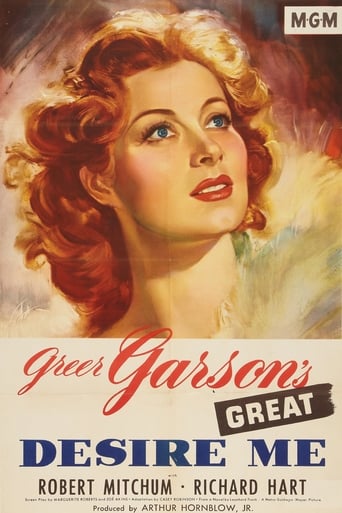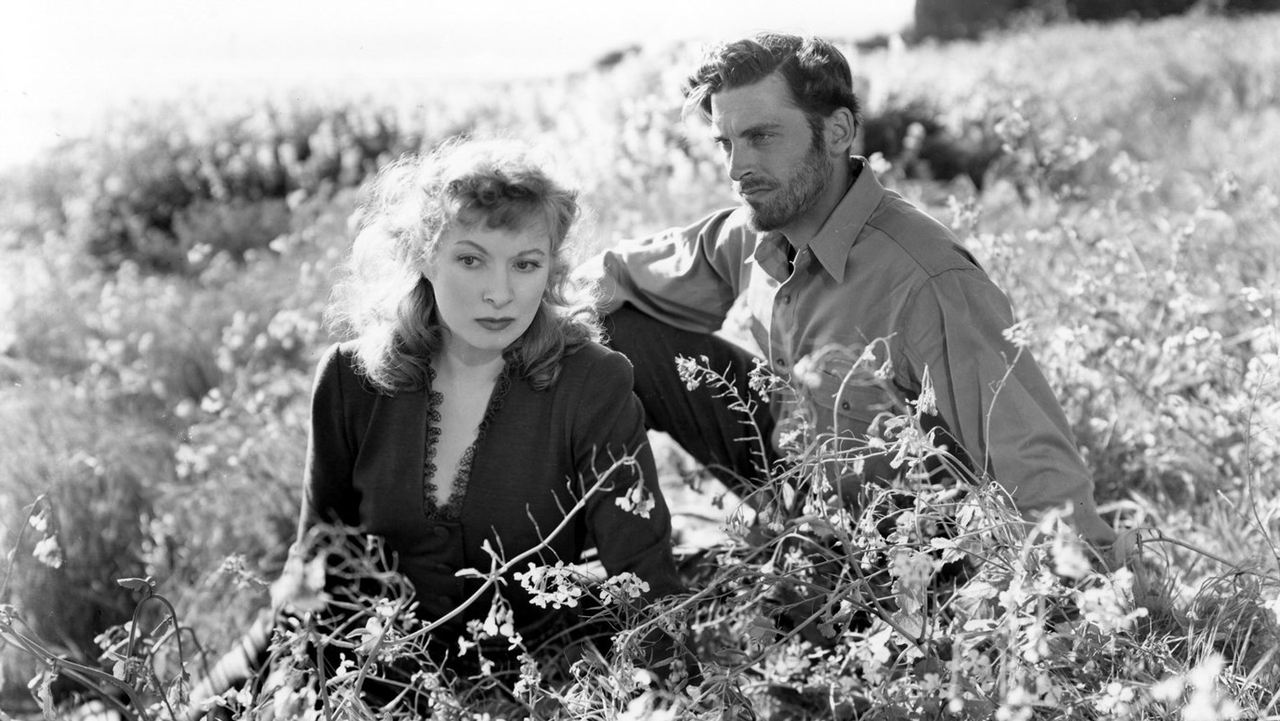mark.waltz
As nobody desires this post war melodrama, especially the four uncredited directors, it landed with a loud thud near the top of MGM's most notorious disasters. By 1947, Greer Garson was the top leading lady at MGM of dramatic parts, more popular than glamour girl Lana Turner, much more well liked than the eccentric Katharine Hepburn, and the only actress in Hollywood outside of Bette Davis to seemingly be nominated for an Oscar almost every year. For the former Mrs. Miniver and Madame Curie, all it seems that she needed to do was get a script, memorize her part, and gold would strike. Unfortunately, she had flopped with "Adventure", and this, her first film after that, signaled that pairing her with anybody other than Walter Pidgeon, was probably not a good idea. Garson for this film got two leading men, Quickly rising up the ranks after years of minor parts and sudden success, brooding Robert Mitchum was cast as one of her two leading men here, and the forgotten Richard Hart was cast in the other major male role. What ends up happening here is a screenplay so messed up that upon the initial screening, I'm surprised that Louis B. himself didn't order the film shelved, simply to save face for the obvious fiasco that it is. Too moody and weird, this film has a structure that can only be described as an art house film that just didn't work. It's a post war story about the turmoil that supposed widow Garson goes through when her husband's pal (Hart) shows up to help Garson deal with her grief. Brief flashbacks to Garson marrying Mitchum follow to add confusing twists in the mix. The set direction and photography take over as the stars, but all that remains is an attractive 90 minute bore that seems to take itself too seriously as a piece of art.While there are a ton of extras in overstuffed crowd scene's, there's only the three actors credited in the opening that ends with producer credit rather than director credit. Several writers are also listed, as is the original novelist, so if the issue is the credited scriptwriter than the director, why did they not settle on at least one. The harsh roaring waves seem to be a metaphor for the crashdown of the film. Worse is the fact that you never really get to care about the lead males, and Garson overplays the nobility, making her saintlike, especially in the over the top musical moments in church where the choir is going way overboard to sound heavenly.
Felonious-Punk
Its structure is intense. The way it's edited kept me always on the tip of my toes. I was biting my nails through half of it, and feeling a nervous guilt in the pit of my stomach through the other half. This movie has it all, from one of the best escape scenes ever, to a whole spectrum of emotional truths. I found myself switching my opinions many times about the characters and what actions they should take. All the way through the ending, I was proud for the people who lent their efforts to make this movie. The acting and cinematography are unbeatable. I repeat, unbeatable! It might not be air-tight in plot details, but it gets a certain sense of cinematic perfection across that can also be found in other 1947 movies like "Out of the Past" and "Black Narcissus". I love those movies just as much as this one, if not more, so it's a little baffling how hard people are ragging on it. It seems like the making of the movie was beset by hardship, and left a bad taste in the mouth of a lot of the cast and crew, but I see no reason that it should leave a bad taste in our mouths. It's just too gorgeous a movie to forget about. And any hardship and injury that came of it only makes the cinematic achievement that much more astounding. But ultimately, this movie's greatest achievement is that it surprisingly exudes a maturity that is more common in movies made closer to the present, for example, Mike Leigh's morality-play movies "Vera Drake" (2004) and "Another Year" (2010). It's time "Desire Me" had a re-evaluation, if you ask me.
MartinHafer
This film has an odd cast--a bunch of non-French actors playing French people without traces of accents. It's hard to imagine Robert Mitchum as being a man living in Normandy, but he and Greer Garson both star in "Desire Me"--along with Richard Hart.The film begins shortly after WWII. Garson has been living alone since the war began--her husband (Mitchum) in a German concentration camp. She'd since received word that he was dead, but she still is holding out hope that he'll return. A man arrives (Hart) who tells Garson that he was Mitchum's friend and saw him die while trying to escape--and he knows so many, many details about her that his story about being Mitchum's best friend made sense.A bit later in the film, things began to stop making sense. While Garson had fallen in love with Hart, he proved to be very moody and unpredictable--so much so that it makes you wonder how Garson would want to be with this guy. Some of this was done because it fit in with the plot--some of it was due to sloppy writing.Eventually, Hart gets Garson to agree to sell her husband's old business and move to Paris with him. However, in true Hollywood fashion, Mitchum arrives in town--and it's obvious Hart is a liar and cheat. This leads to a showdown between the two men--and Hart seems quite willing to kill his 'old friend'.While this film has some interesting moments and the romance between Garson and Hart is nice to watch (at least at first), the film is far-fetched and a bit confusing. The part that had me shaking my head was Garson's reaction to Mitchum's return--behaving like a woman guilty of something. Were they trying to imply she'd slept with Hart? If not, why the guilt and why would she tell her beloved husband that she would leave him?! In fact, none of this made any sense---and I really wanted it to. And, following the showdown, Garson's reaction seemed even more bizarre---what was motivating her?! Why did she act that way?! Didn't this all seem pretty sloppy?! Apparently others thought the same, as the film was seen as a big disappointment--and I can see why. With this locale and the basic script idea, it should have been a lot better--and more polished and coherent.
wes-connors
Frenchwoman Greer Garson (as Marise) tells her psychiatrist about her complicated relationship with two men. In flashback, her story begins (mostly) with the arrival of handsome Richard Hart (as Jean) at her coastal cottage, in Normandy. Mr. Hart has some bad news and some good news for Ms. Garson.The bad news is that he informs her that handsome husband Robert Mitchum (as Paul) has been killed by Nazis. The good news is that he, Hart, has fallen in love with Garson, through the stories told by buddy Mitchum. Lonely, Garson catches Hart bathing, and invites him to stay. Of course, Mitchum returns
An old storyline, updated for war and psychiatry. This was supposed to be George Cukor's picture, but he left; and, nobody received director's credit. Still, there are some nicely shot scenes, thanks to a nice, albeit too foggy as the film progresses, location. Joseph Ruttenberg photographs Garson and the coast with love.**** Desire Me (10/31/47) George Cukor ~ Greer Garson, Richard Hart, Robert Mitchum



 AD
AD
